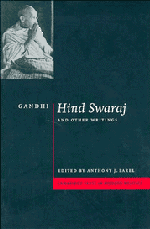Book contents
- Frontmatter
- Contents
- Acknowledgements
- Editor's introduction
- A note on the history of the text
- Principal events in Gandhi's life
- Biographical synopses
- Guide to further reading
- Glossary and list of abbreviations
- HIND SWARAJ
- Preface to the English translation
- Foreword
- I The Congress and its officials
- II The Partition of Bengal
- III Discontent and unrest
- IV What is Swaraj?
- V The condition of England
- VI Civilisation
- VII Why was India lost?
- VIII The condition of India
- IX The conditions of India (cont.): railways
- X The condition of India (cont.): the Hindus and the Mahomedans
- XI The condition of India (cont.): lawyers
- XII The conditions of India (cont.): doctors
- XIII What is true civilisation?
- XIV How can India become free?
- XV Italy and India
- XVI Brute force
- XVII Passive resistance
- XVIII Education
- XIX Machinery
- XX Conclusion
- APPENDICES
- SUPPLEMENTARY WRITINGS
- Bibliography
- Index
III - Discontent and unrest
Published online by Cambridge University Press: 10 November 2010
- Frontmatter
- Contents
- Acknowledgements
- Editor's introduction
- A note on the history of the text
- Principal events in Gandhi's life
- Biographical synopses
- Guide to further reading
- Glossary and list of abbreviations
- HIND SWARAJ
- Preface to the English translation
- Foreword
- I The Congress and its officials
- II The Partition of Bengal
- III Discontent and unrest
- IV What is Swaraj?
- V The condition of England
- VI Civilisation
- VII Why was India lost?
- VIII The condition of India
- IX The conditions of India (cont.): railways
- X The condition of India (cont.): the Hindus and the Mahomedans
- XI The condition of India (cont.): lawyers
- XII The conditions of India (cont.): doctors
- XIII What is true civilisation?
- XIV How can India become free?
- XV Italy and India
- XVI Brute force
- XVII Passive resistance
- XVIII Education
- XIX Machinery
- XX Conclusion
- APPENDICES
- SUPPLEMENTARY WRITINGS
- Bibliography
- Index
Summary
reader: Then you consider Partition to be a cause of the awakening? Do you welcome the unrest which has resulted from it?
editor: When a man rises from sleep, he twists his limbs and is restless. It takes some time before he is entirely awakened. Similarly, although the Partition has caused an awakening, the comatose state has not yet disappeared. We are still twisting our limbs and still restless, and just as the state between sleep and awakening must be considered to be necessary, so may the present unrest in India be considered a necessary and, therefore, a proper state. The knowledge that there is unrest will, it is highly probable, enable us to outgrow it. Rising from sleep, we do not continue in a comatose state, but, according to our ability, sooner or later, we are completely restored to our senses. So shall we be free from the present unrest which no one likes.
reader: What is the other form of unrest?
editor: Unrest is, in reality, discontent. The latter is only now described as unrest. During the Congress period it was labelled discontent; Mr Hume always said that the spread of discontent in India was necessary. This discontent is a very useful thing. So long as a man is contented with his present lot, so long is it difficult to persuade him to come out of it. Therefore it is that every reform must be preceded by discontent.
- Type
- Chapter
- Information
- Gandhi: 'Hind Swaraj' and Other Writings , pp. 24 - 25Publisher: Cambridge University PressPrint publication year: 1997

